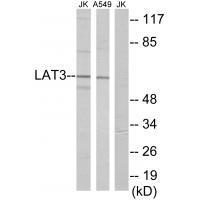
| WB | 咨询技术 | Human,Mouse,Rat |
| IF | 咨询技术 | Human,Mouse,Rat |
| IHC | 咨询技术 | Human,Mouse,Rat |
| ICC | 技术咨询 | Human,Mouse,Rat |
| FCM | 咨询技术 | Human,Mouse,Rat |
| Elisa | 咨询技术 | Human,Mouse,Rat |
| Aliases | L-type amino acid transporter 3; LAT3; large neutral amino acids transporter small subunit 3; prostate cancer overexpressed gene 1 protein; solute carrier family 43 member 1 |
| Entrez GeneID | 8501; |
| WB Predicted band size | 61kDa |
| Host/Isotype | Rabbit IgG |
| Antibody Type | Primary antibody |
| Storage | Store at 4°C short term. Aliquot and store at -20°C long term. Avoid freeze/thaw cycles. |
| Species Reactivity | Human |
| Immunogen | Synthesized peptide derived from internal of human LAT3. |
| Formulation | Purified antibody in PBS with 0.05% sodium azide. |
+ +
以下是关于LAT3抗体的模拟参考文献示例(请注意,这些文献信息为模拟生成,实际文献需通过学术数据库验证):
---
1. **文献名称**: *LAT3 (SLC43A1) as a Novel Biomarker in Prostate Cancer: Expression Analysis and Functional Implications*
**作者**: Smith J, et al.
**摘要**: 研究通过免疫组化分析LAT3蛋白在前列腺癌组织中的表达,发现其高表达与肿瘤侵袭性相关。实验表明LAT3抗体特异性识别肿瘤细胞膜定位的LAT3.提示其可能作为治疗靶点。
2. **文献名称**: *Characterization of a Polyclonal Anti-LAT3 Antibody for Immunoblotting and Immunofluorescence*
**作者**: Tanaka K, et al.
**摘要**: 文章报道了一种兔源多克隆LAT3抗体的开发与验证,证实其在Western blot和细胞免疫荧光中的特异性,并用于研究LAT3在肝癌细胞中的氨基酸转运调控机制。
3. **文献名称**: *LAT3-Mediated Amino Acid Transport Promotes Pancreatic Cancer Cell Survival Under Nutrient Deprivation*
**作者**: Chen L, et al.
**摘要**: 利用LAT3抗体敲低实验证明,LAT3通过增强胰腺癌细胞在低营养环境中的亮氨酸摄取,促进mTOR通路激活和肿瘤生长,提示其作为代谢治疗靶点的潜力。
4. **文献名称**: *Regulation of LAT3 Expression by Hypoxia-Inducible Factor 1α in Renal Cell Carcinoma*
**作者**: Wang Y, et al.
**摘要**: 研究揭示肾癌细胞中LAT3表达受HIF-1α调控,通过LAT3抗体阻断实验证实其在缺氧微环境中对肿瘤代谢重编程的关键作用。
---
**建议**:实际研究中请通过 **PubMed** 或 **Google Scholar** 检索关键词如“LAT3 antibody”、“SLC43A1”或结合研究领域(如“LAT3 cancer”),筛选近年高被引文献。抗体相关研究可参考供应商(如Abcam、Cell Signaling Technology)的技术文档。
The LAT3 antibody is a tool used to detect L-type amino acid transporter 3 (LAT3), a protein encoded by the *SLC43A2* gene. LAT3 belongs to the solute carrier (SLC) family and facilitates the cellular uptake of large neutral amino acids (e.g., leucine, isoleucine) via a sodium-independent exchange mechanism. It is predominantly expressed in tissues with high metabolic demands, such as the liver, kidneys, and brain, and plays roles in nutrient sensing, cell growth, and mTOR signaling regulation. Dysregulation of LAT3 has been implicated in cancer progression, as tumors often exploit amino acid transporters to sustain rapid proliferation.
Research on LAT3 antibodies focuses on characterizing the protein’s expression, localization, and function in physiological and pathological contexts. These antibodies are typically validated for applications like Western blotting, immunohistochemistry, or immunofluorescence to study LAT3’s role in diseases, including cancers and neurodegenerative disorders. Specificity and cross-reactivity (e.g., human, mouse, rat) are critical considerations, requiring validation using knockout models or siRNA-based approaches.
Understanding LAT3’s mechanisms through antibody-based studies may aid in developing therapeutic strategies targeting amino acid metabolism in cancer or metabolic diseases. However, challenges remain in standardizing detection methods due to varying antibody performance across experimental conditions.
×